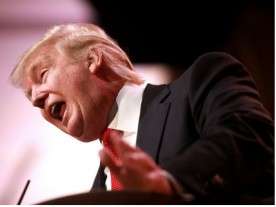Donald Trump Finally Sees the Light On Foreign Techies
After maligning Rubio, he now says they are economic assets and shouldn't be sent packing.
During the presidential debate Wednesday night, Trump was caught in a flat-out lie when he denied that he'd ever accused Sen. Marco Rubio of being Facebook chief Mark Zuckerberg's personal senator by pushing visas for foreign-born techies. In fact, Trump had said that very thing—and not in an unguarded moment to an interviewer, but in his own white paper on immigration (along with promising to deport 11 million undocumented immigrants and

their American-born children).
Trump's paper also noted that "we graduate two times more Americans with STEM (Science, Technology, Engineering, Math) degrees each year than can find jobs"—implying that there was no need for the U.S. government to hand out more H-1B visas to foreign workers in these fields. Yet there he was at the debate claiming that he never had any disagreement with Zuckerberg, and was totally on board with letting talented foreign techies stay and work in Silicon Valley.
Credit Trump for this, I suppose: He has lied and flip-flopped his way into the correct position. Because his previous view was based on nothing but restrictionist nonsense.
Restrictionists have long claimed that Zuckerberg and the Silicon Valley crowd, who lobby for more tech workers to be let into the U.S., are doing so not to alleviate any "shortage" of technical talent, but to shore up profits by driving down native wages. But the notion that without foreign techies native wages would rise is a complete fantasy based on rather crude notions of supply and demand. The truth, actually, is the opposite.
Now, in a strict sense, there is no "shortage" of foreign tech workers in America. But that's because "shortages" rarely exist in a market economy with a nominally functioning price mechanism where private business activity can expand or contract or in other ways adapt to the available factors of production.
The lack of "shortages," however, doesn't mean that the high-tech labor market isn't tight, or that there is no cost to forcing companies to deal with an artificial "tightness" in foregone opportunities. But restrictionists deny even that. As proof they make three claims—all false or highly misleading.
FALSE: STEM graduates can't find STEM jobs.
Sen. Jeff Sessions (R-Ala.), Congress' leading restrictionist, claims that 74 percent of the 11 million Americans with STEM degrees work in non-STEM jobs. This implies that some eight million qualified Americans can't find jobs in STEM-related fields at appealing wages. These statistics are based on the Census Bureau's screwy job categorization that counts a physics professor as an educator not a STEM worker, and a computer engineer who has moved into the management side of an IT company as non-STEM. This data, notes the National Foundation for American Policy (a pro-immigration think tank), "would exclude every American recipient of the Nobel Prize in the past 100 years who worked as a professor, which would be classified as a post-secondary teacher, and the CEO of Apple, since management positions typically do not count as a STEM occupation under government classification."
In contrast to Sen. Sessions' claims, the National Science Foundation found that only 5 percent of Americans with bachelor's degrees in engineering, computing, or math were involuntarily working outside their field in 2010.
FALSE: Wages in STEM fields are stagnant
Restrictionists claim that if the STEM labor market were genuinely tight, wages in the industry would rise, but instead, they have been stagnant. The Center for Immigration Studies, an ultra-restrictionist outfit, claims that real hourly wages in STEM fields grew just 0.7 percent a year from 2000 to 2012, on average. But Cato Institute's Alex Nowrasteh points out that those gains look weak only if you forget that overall wages in all occupations during the same time period actually fell by 0.94 percent. Indeed, despite an influx of STEM workers, wages in the field increased even during a recession—showing that there is no "surplus" of foreign tech workers, contrary to CIS claims.
What's more, overall wages in STEM fields, even for native-born workers, are going up, not down. Since 2007, wages in computer-related occupations, the largest H-1B category, grew by 2.7 percent each year for those with bachelor's degrees.
FALSE: Silicon Valley prefers foreign-born tech workers because they are cheap, not because they are gifted
The pro-labor Economic Policy Institute has been at the forefront of popularizing the claim that America gets not the world's best and brightest, but its mediocre. Hence, instead of commanding a premium in the labor market, these ho-hum foreign workers undercut native wages.
A 2013 Brookings Institute study found that foreign tech workers are paid about $9,000 more than Americans with STEM bachelor's degrees in the same occupation and with the same level of experience. Why? Likely because they "provide hard-to-find skills."
What all of this shows is that foreign workers don't threaten American jobs or diminish American wages. By boosting the productivity and growth of American companies, they do the opposite. Indeed, if these workers couldn't come to America, these companies would likely relocate to where these foreign workers are just to remain globally competitive. And if they couldn't do that, they'd shut down or scale back or automate or never take off in the first place. None of this would protect American jobs or wages.
That restrictionists don't get this is one thing. That a business tycoon like Trump took so long to come around on the issue doesn't exactly inspire confidence in his business savvy—his paeans to himself notwithstanding.


Show Comments (85)